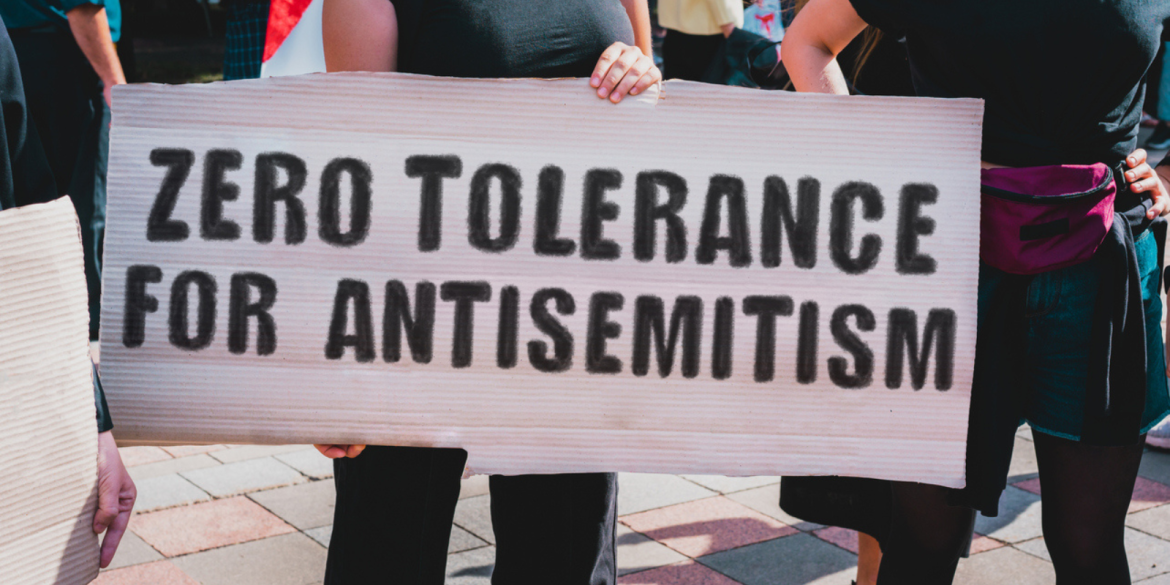
The highlights of the new HU-EF Barometer 2024 on mutual perceptions towards the Holocaust Day shed light on the persistent issue of antisemitism across Europe, revealing concerning trends and perceptions. In France and Germany, a significant majority recognizes antisemitism as a current problem, with figures of 63% and 59% respectively, followed by Great Britain at 48% and Poland at 30%. The perceived sources of this bigotry vary, with German respondents pointing to both the far right and Muslim migrants, while British and French respondents predominantly blame the latter. Only a small minority disagreed with the statement that “Jews [in each respective country] are loyal to Israel first. Disturbingly, a notable portion of respondents in Poland and Germany have never encountered a Jew or Israeli personally, highlighting a potential disconnect. This survey underscores the complexity and urgency of addressing antisemitism in contemporary Europe.
The 2024 HU-EF Barometer, spearheaded by Prof. Gisela Dachs from the European Forum at the Hebrew University, conducted a comprehensive survey on mutual perceptions between Israel and several European countries, including Germany, Great Britain, France, and Poland.
Highlights
Antisemitism Perception: France (63%) and Germany (59%) perceive antisemitism as a significant issue, followed by Great Britain (48%) and Poland (30%).
Antisemitism is currently a problem in your country (%)
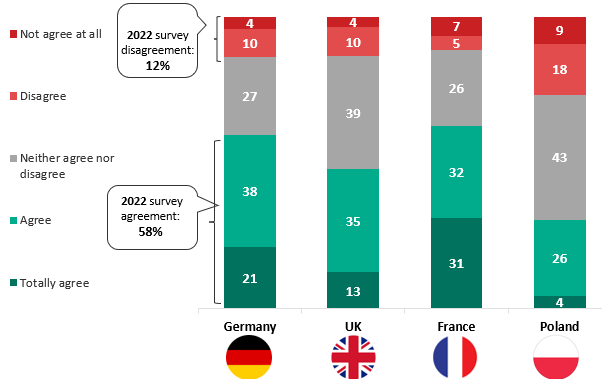
Loyalty Perception: In all four countries, only a small minority disagreed with the statement that “Jews [in each respective country] are loyal to Israel first.” The majority neither agreed nor disagreed, while more than a third affirmed the statement.
Jews are loyal to Israel first (%)
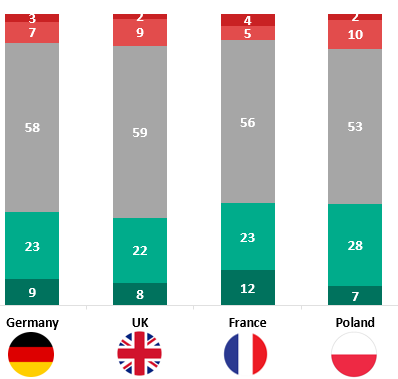
Threat Sources: When examining the sources of Antisemitism, opinions on the sources vary among and within different European populations. German respondents identify the far right (48%) and Muslim migrants (45%) as primary contributors. In Britain, 39% expressed uncertainty, while 25% attributed it to Muslim migrants. French respondents largely attribute it to Muslim migrants (31%), with 26% either uncertain or attributing it to the general population. In Poland, 31% implicate the far right, 27% are uncertain, and 26% identify Muslim immigrants as the source.
From where do you currently see the main threat of Antisemitism emanating? (%, among those who agreed that antisemitism is a problem)
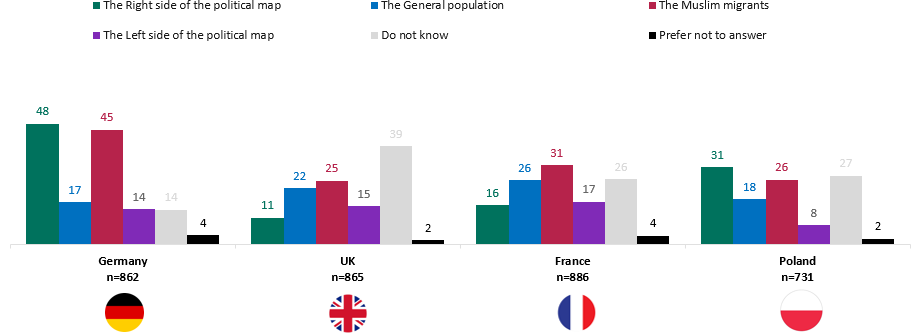
• Responders could reply more than one answer
Lack of Personal Interaction: 59% of Polish and 41% of German respondents have never met a Jew or Israeli, with older Germans (47%) and younger Poles (63%) comprising the majority.
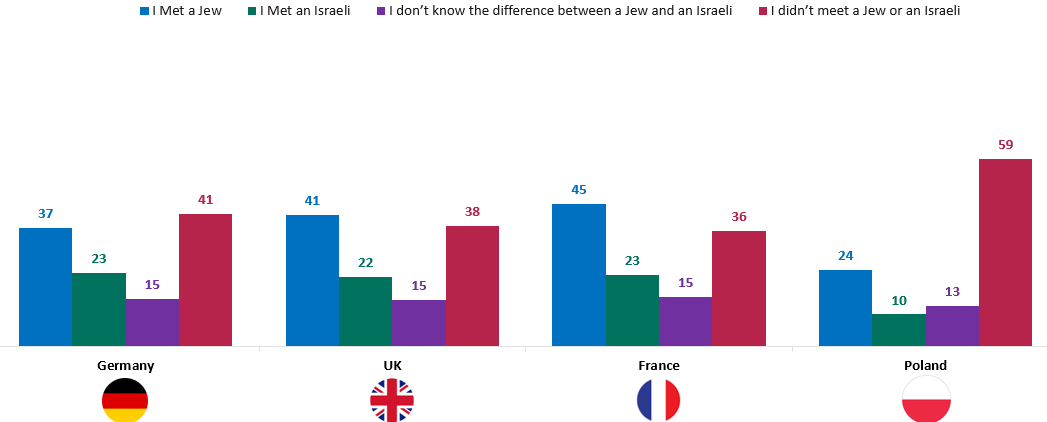
Israeli Responses
Future Outlook: 70% of Jewish Israelis anticipate a worsening situation for European Jews, up from 53% in 2022, with pessimism increasing with age.
France’s Antisemitism Ranking: France is perceived as the most antisemitic country among Israeli Jews (63%) and Israeli Arabs (55%).

German Responses
National Interest – 45% of the respondents think that Israel´s existence is part of Germany´s national interest, but only 22% agree with their current government´s support of Israel in its military operation in Gaza.
The perception of Germany towards Israel (% among German responders)
“The secure existence of Israel is part of Germany’s national interest today” then Chancellor Angela Merkel, said in 2008 – do you agree?
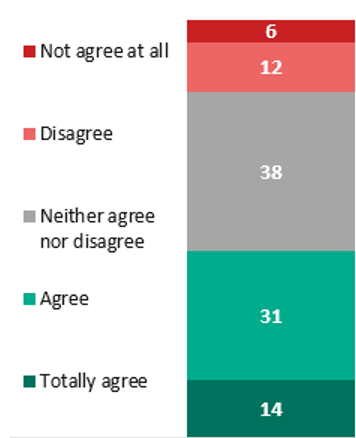
Approval of the German government’s support of Israel in its military operation in Gaza (%)
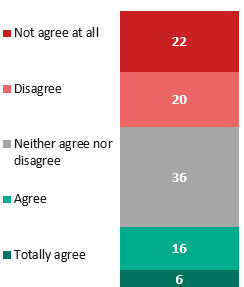
French Responses
France’s Historical Reflection: Half of French respondents believe their country has reconciled with its Vichy past, contrasting with 36% who disagree.
Think that France has managed to come to terms with its Vichy-past (% Among French responders)
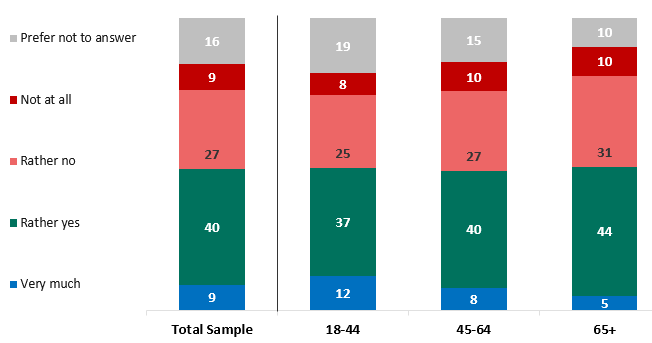
Polish Responses
Holocaust Perception: 60% of Polish respondents view Poles as victims and saviors during the Holocaust, whereas a majority of Israeli respondents hold them accountable, similar to Germans.
Poland’s “role” during the Holocaust (%, Polish Respondents)
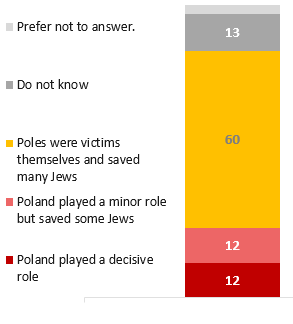
Are the Polish people responsible for their Jewish neighbors being destroyed in the Holocaust? (%, Israeli respondants)
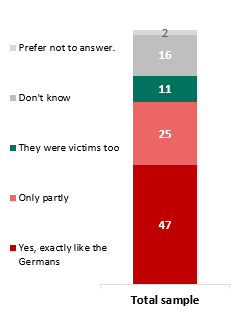
Conditions for Israeli Youth Visits: Polish respondents prefer Israeli youth visits with Polish guides, while in Israel, a majority agree but with Israeli guides in charge, favored by one-third.
Methodology
The survey was prepared by Prof. Gisela Dachs from the Hebrew University. It was conducted in Israel, Germany, United Kingdom, France and Poland via the internet between February-March 2024 with a total of 1,000 men and women from each country constituting a nationally representative sample of the adult population aged 18 and over. The maximum sampling error was 3.1% at a confidence level of 95%. The online surveys were carried out by Kantar.
Researchers:
Prof. Gisela Dachs is from the DAAD Center for German Studies Center and the European Forum at the Hebrew University of Jerusalem.
The Hebrew University of Jerusalem is Israel’s premier academic and research institution. With over 25,000 students from 90 countries, it is a hub for advancing scientific knowledge and holds a significant role in Israel’s civilian scientific research output, accounting for nearly 40% of it and has registered over 11,000 patents. The university’s faculty and alumni have earned eight Nobel Prizes and a Fields Medal, underscoring their contributions to ground-breaking discoveries. In the global arena, the Hebrew University ranks 86th according to the Shanghai Ranking. To learn more about the university’s academic programs, research initiatives, and achievements, visit the official website at http://new.huji.ac.il/en
